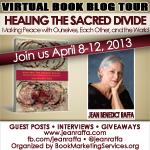Please welcome guest blogger Jean Benedict Raffa, Ed.D., author of Healing the Sacred Divide: Making Peace With Ourselves, Each Other, and the World. Since making peace with oneself is one of my interests and an important part of what I teach, I am delighted to have Jean contribute to The roadSIGNS Coach.
We all have a shadow composed of everything we don’t want to know about ourselves. If you want to grow as a person you need to come to terms with it, because if you don’t it will create problems for you in your work and relationships. But how do you do that? Here’s a handy guide for recognizing your dark shadow.
Step 1: Notice Symptoms: Each shadow is a complex of tangled attitudes, emotions, thoughts and responses you habitually have to a certain type of situation. You’ve lived with this uncomfortable inner environment for so long that you just don’t notice it coming until it’s too late and the storm is upon you. So your first goal is to notice when something has been stirred up such that your mood, energy, body language, emotions or thoughts are no longer within your comfort zone, and then figure out why this happened. Here’s an example of how this process might look.
Your first clue : Body language: You woke up feeling good this morning. You made your coffee, skimmed through your favorite parts of the paper, started the crossword puzzle. After a while you sigh and prop your chin in your hands. You realize your shoulders are sagged over the table, you’ve put your pencil down, and you don’t feel like finishing the crossword puzzle. What’s going on here? You love doing the crossword puzzle.
Your second clue: Uncomfortable feelings: You notice you’re feeling a bit low. In fact, you’re feeling sad, ashamed, and disgusted with yourself. And maybe a bit sorry for yourself. Why?
Your third clue: Negative self-talk: You ask yourself what you were thinking about while you were working on the puzzle: “I’m a terrible friend. I should have called Mary right away when I heard she was ill. I never think to help others. I’m so self-absorbed and selfish. And my work on my latest project is laughable! I was so proud of my idea and thought I was so smart. And now I hate it! Why was I so stupid to think it was good? I’ll never be any good at this kind of work. What’s wrong with me? Am I lazy? Or just stupid?” Where did those thoughts come from?
Step 2: Locate the trigger: You re-trace your steps. Oh, yes. You were reading the advice column and a lady wrote complaining that she was sick and no one from work called to find out what was wrong or offer to help. The columnist wondered if she was making an effort to be friendly at work. That’s when you started feeling guilty. One thought led to another and soon you were beating yourself up about all sorts of things.
Step 3: Analyze your response: Obviously you’re a very sensitive and well-intentioned person who wants to be kind to people and do good work, but something in you sabotages your efforts and well-being. That one little comment in the paper led to a spate of self-criticism about your character, work skills, and thinking ability. Do you see how you jumped from reading the advice column to criticizing yourself to feeling sad and dejected? If you go to work that way you’re not going to have the energy or desire to be friendly or do your best. So if you can recognize the symptoms of your shadow you can de-fuse it before it takes control of you by giving it a name, like “Critical Bully,” asking it to back off and give you a break, and then forgiving yourself for being human.
The good news is that everyone also has “bright” shadow of which they’re unaware. This is composed of their soul’s true, healthy, undeveloped potential. Why would someone not develop their bright shadow? Because they learned early in life that the way to stay safe and comfortable was to hide parts of themselves.
For example, some families encourage interest in creative pursuits like music, drama, drawing or writing, while others see these things as “putting on airs” or “only for sissies,” or “a waste of time and you’ll never make any money at it!” Many find being smart and aspiring to college admirable. Others might call you a “nerd,” or accuse you of “trying to rise above yourself,” or of thinking “you’re better than everyone else!”
Psychologist Margaret Paul wrote on Huffington Post, “When I was growing up, my parents made it very clear that feelings were to be avoided. I heard homilies such as “don’t cry over spilled milk,” or “I’ll give you something to cry about.” When I was upset or crying, I was ignored or sent to my room. The only difficult feeling that seemed to be allowed was my mother’s anger — but not mine. The only feeling I was allowed was ‘happy.’ Not only did I learn never to share any feelings other than ‘happy’ with my parents, I also learned to stay in my head and disconnect from my feelings. It was the only sensible way to cope with life in my home.”
As long as we disconnect from our feelings we won’t find our bright shadow. To “follow your bliss” you have to feel it! Until you do, you’ll project it onto others, and that can become problematic. For example, we might over-idealize someone with a gift or talent we’ve repressed, then reject them when they disappoint us by being as human as everyone else. Other problems arise when we repress genuine strengths and obsess over unfulfilling substitutes. For example, maybe we were criticized as a child for being too proud and bossy, so we repressed our natural leadership qualities and tried to act humble all the time. Not only does this waste a lot of energy, but it can birth resentment, self-righteousness, and a sense of superiority.
Here’s a trick to discovering your bright shadow. Make a list of five people you deeply admire, known or unknown, real or fictional. Beside each name note their qualities that you most like. Re-read your list knowing that these qualities are undeveloped aspects of your bright shadow which you have projected onto these people. They really are, you know. So ask yourself what steps you can take to develop these qualities in yourself, and then…take them.
Jean Raffa is an author, speaker and workshop leader. Her newest book, Healing the Sacred Divide: Making Peace With Ourselves, Each Other, and the World, is a product of 19 years of research and writing about psychological integration as a spiritual path to evolving consciousness. It recently received the 2013 Wilbur Award from the Religion Communicators Council for best non-fiction book by an individual in secular media who communicates religious issues, values and themes with professionalism and fairness, and encourages understanding between faith groups on a national level. You can find more about Jean’s books at her website, www.jeanraffa.com. Matrignosis, her blog about inner wisdom, is at www.jeanraffa.wordpress.com.


